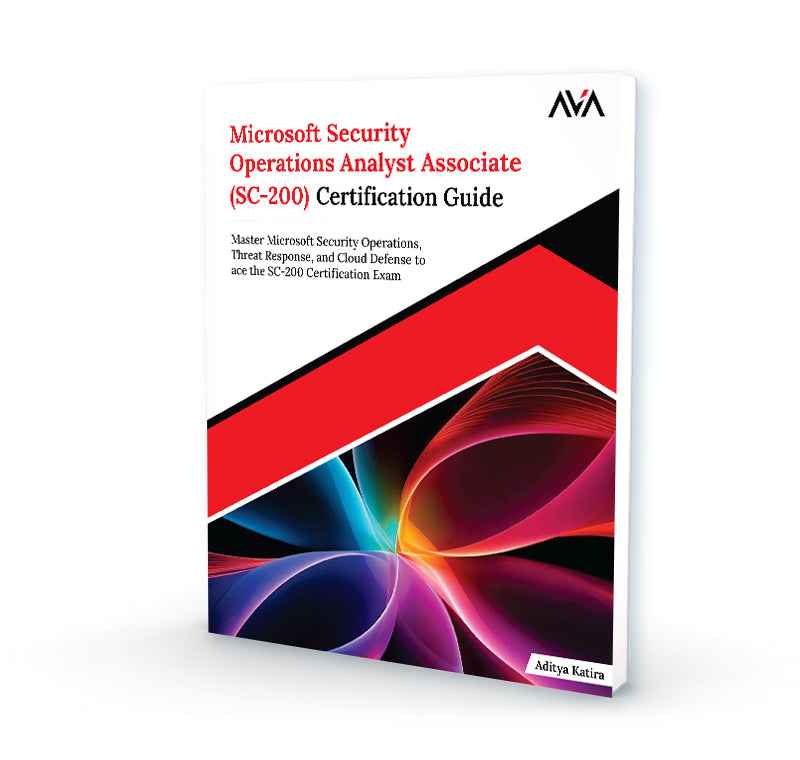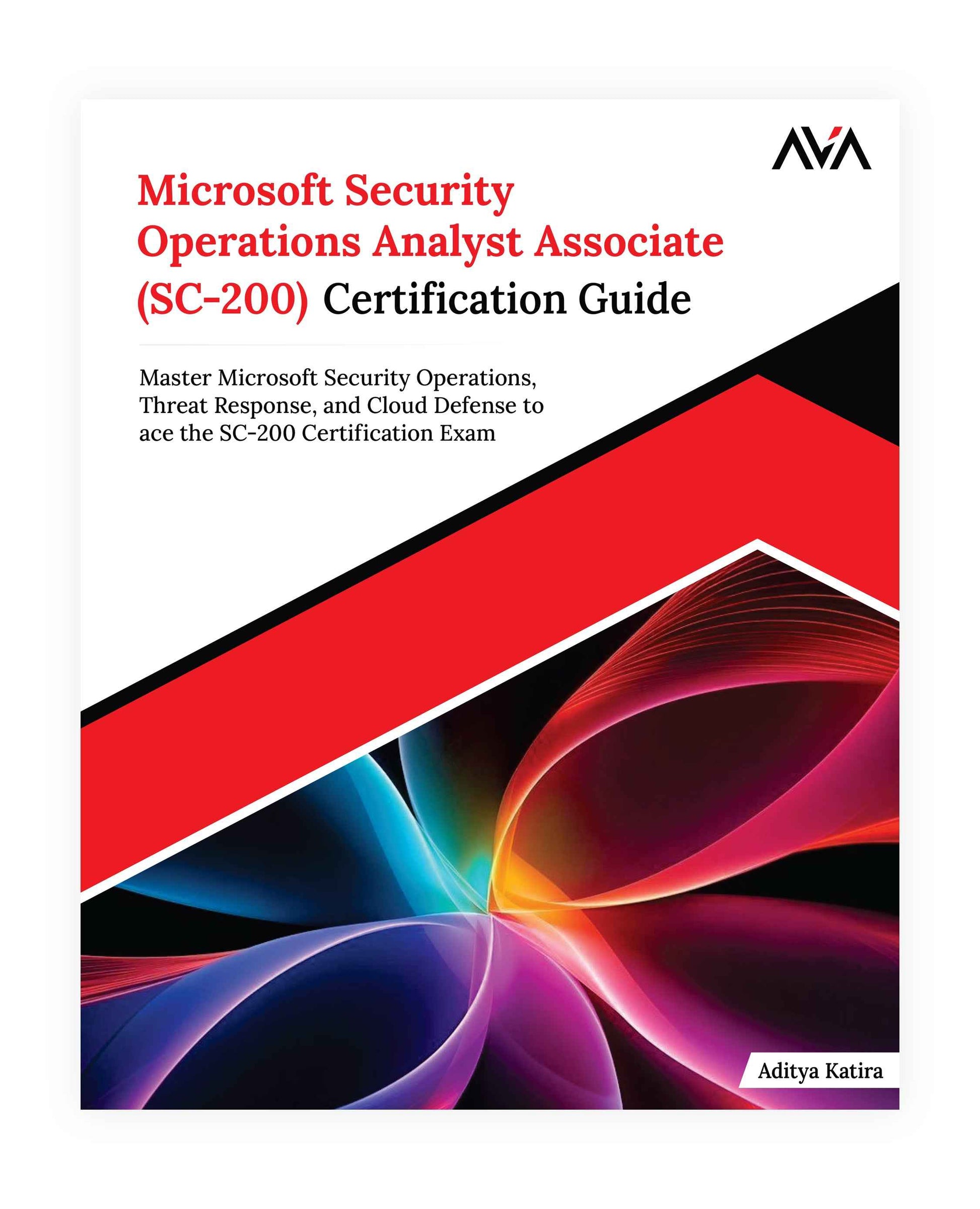Microsoft Security Operations Analyst Associate (SC-200) Certification Guide
Microsoft Security Operations Analyst Associate (SC-200) Certification Guide
SKU:9789349888449
Couldn't load pickup availability
ISBN: 9789349888449
eISBN: 9789349888814
Rights: Worldwide
Author Name: Aditya Katira
Publishing Date: 12-June-2025
Dimension: 7.5*9.25 Inches
Binding: Paperback
Page Count: 488
Share


Collapsible content
Description
Detect, Investigate, and Respond to Threats with Microsoft tools
Key Features
● In-depth coverage of Microsoft SC 200 Certification to secure identities, endpoints, and cloud workloads across hybrid environments.
● Hands-on guidance with KQL, threat hunting, and automation to simulate real-world security operations.
● Exclusive insights on AI-powered security using Microsoft Copilot and emerging trends shaping the future of SOC operations.
Book DescriptionThe Microsoft Security Operations Analyst certification (SC-200) is a vital credential for anyone aiming to excel in modern cybersecurity roles. TheMicrosoft Security Operations Analyst Associate (SC-200) Certification Guideis your companion for mastering the skills and tools needed to pass the exam and thrive as a Security Operations Analyst in Microsoft environments.
Through in-depth coverage of Microsoft Sentinel, Microsoft Defender for Cloud, and Microsoft 365 Defender, you'll learn to detect, investigate, and respond to threats across hybrid and cloud infrastructures. With a focus on real-world use cases, this book walks you through key concepts such as threat mitigation, incident response, and security monitoring—all aligned with the latest SC-200 objectives.
You’ll gain hands-on experience configuring Microsoft’s security tools, writing queries using Kusto Query Language (KQL), creating custom detection rules, and automating responses for streamlined SOC operations. Each chapter builds your expertise through practical examples and exercises, helping bridge the gap between certification prep and operational readiness. Whether you're looking to boost your cybersecurity career or strengthen your organization’s defenses, this guide provides the knowledge and exam confidence you need.
Take the next step to become a Microsoft Security Operations Analyst expert.
What you will learn
● Configure and operationalize Microsoft Defender for Identity, Endpoint, and Cloud to protect users and resources.
● Leverage Microsoft Copilot for Security to enhance investigation and response using generative AI capabilities.
● Implement Data Loss Prevention (DLP), Insider Risk Management, and eDiscovery for robust information protection.
● Use Kusto Query Language (KQL) to analyze logs, hunt threats, and develop custom queries.
● Enhance security visibility through effective use of data connectors and threat intelligence feeds in Microsoft Sentinel.
● Automate detection and response workflows using Sentinel’s playbooks, analytics rules, and notebooks for advanced threat management.
Who is this book for?
This book is ideal for security analysts, system administrators, and IT professionals preparing for the SC-200: Microsoft Security Operations Analyst certification. It is also valuable for those looking to deepen their expertise in Microsoft security solutions. A working knowledge of Microsoft Azure, Microsoft 365, and core cybersecurity concepts is recommended to get the most from this guide.
Table of Contents
1. Microsoft Defender Identity Endpoint Cloud and More
2. Microsoft Copilot for Security with AI Assistance
3. Mastering Data Protection with Data Loss Prevention, Insider Risk, and Content Search
4. Securing Endpoint Deployment Management and Investigation
5. Managing Security Posture Across Platforms
6. KQL Mastery for Querying Analyzing and Working with Security Data
7. Optimizing Security Operations with Log Management Watchlists and Threat Intelligence
8. Expanding Security Visibility with Data Connectors in Microsoft Sentinel
9. Tactical Threat Management with Detection Automation and Response
10. Decoding Threat Hunting by Leveraging Search Jobs and Notebooks
11. Future Trends in Security Operations
Index
About Author & Technical Reviewer
Aditya Katira is a cybersecurity strategist and practitioner with over a decade of experience securing cloud environments, architecting proactive defense strategies, and empowering organizations stay ahead of evolving threats. Specializing in Microsoft security ecosystems, he bridges technical execution with strategic vision, ensuring security aligns with both operational agility and regulatory compliance.
Aditya Katira is a highly certified expert in both Microsoft and cloud security, holding credentials such as AZ-900, AZ-104, AZ-305, AZ-500, SC-900, SC-200, AZ-400, SAA-C02, and SCS-C02. This extensive list showcases his broad cloud expertise alongside deep specialization in the Microsoft security ecosystem. His career is marked by significant contributions to designing and optimizing Security Operations Centers (SOCs), implementing Microsoft Sentinel for large-scale threat detection, and developing automated response playbooks utilizing KQL and Microsoft Defender XDR.
Aditya brings extensive hands-on experience in architecting Zero Trust frameworks for organizations ranging from startups to Fortune 500 enterprises. His strategic use of Microsoft’s security stack has led to measurable improvements in security outcomes, including a 60% reduction in Mean Time to Detect (MTTD). His expertise spans configuring Microsoft Defender for Cloud, integrating threat intelligence feeds, and aligning security defenses with diverse requirements stemming from information security frameworks such as NIST CSF, CIS Controls, ISO 27001, and CSA STAR. He also ensures compliance with major regulatory mandates such as GDPR, HIPAA, PCI-DSS, as well as industry-specific standards including FedRAMP, CMMC, SOC 2, and emerging financial regulations such as DORA. This real-world experience directly aligns with the practical focus of the SC-200 certification exam.
Aditya Katira believes that cybersecurity is like going to the gym: "You can't get better by watching others; you've got to go there every day."
ABOUT TECHNICAL REVIEWER
Abhinav Virpal Singh is a software engineering professional with over two and a half years of experience at DXC Technologies, where he serves as an Analyst II. His expertise spans the development, deployment, and maintenance of enterprise- level applications addressing intricate business requirements across diverse sectors. Abhinav holds a Diploma in Information Technology and a Bachelor's degree in Electronics and Telecommunication Engineering, providing him with a robust understanding of both theoretical concepts and practical applications crucial for his work in software engineering and cloud technologies.
Throughout his career, Abhinav has cultivated significant expertise in cloud computing platforms, notably Microsoft Azure and Google Cloud Platform (GCP), as evidenced by his industry certifications. His work demonstrates a strong grasp of modern software architectures, cloud-native development principles, and leading practices for constructing resilient, scalable, and secure systems. In addition to his cloud expertise, Abhinav is deeply interested in cybersecurity. He actively promotes the integration of secure engineering practices as a fundamental aspect of building efficient and trustworthy digital environments, advocating for "security by design" approach and actively incorporating secure coding and DevSecOps methodologies.
As a technical reviewer, Abhinav adopts a meticulous and methodical approach, prioritizing clarity, accuracy, and technical soundness. His passion for contributing to the technology ecosystem is driven by the belief in the power of well-communicated knowledge to foster innovation and a more secure technological future. Through his involvement in this book, Abhinav aims to support the dissemination of high-quality content that underscores the critical role of security in software engineering, reflecting his ongoing dedication to excellence, continuous learning, and the advancement of secure and efficient software systems.


